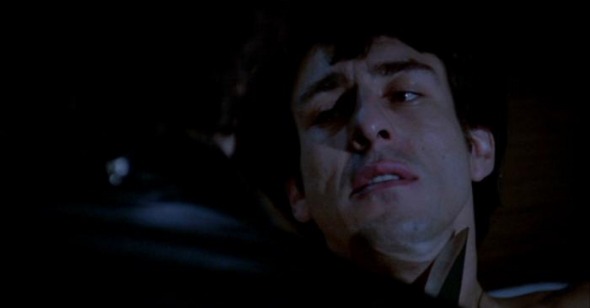Return of the Repressed
by Michael Koresky
Cruising
Dir. William Friedkin, U.S., Paramount Pictures
There are untold artistic benefits to living in a culture of critical reassessment—otherwise, what would current generations think of Vertigo? But if the glut of superfluous "special edition" DVD packages over the past ten years is any indicator, then there are also some sorry side effects. Falling somewhere between the enshrined camp package (Mommie Dearest's Hollywood Royalty Edition, complete with John Waters commentary track!) and the sober-minded resurrection of the long unavailable and disenfranchised as crucial artifact (the recent "Films of Alejandro Jodorowsky" box set, featuring El Topo) will surely be Warner Home Video's imminent deluxe edition of William Friedkin's 1980 film maudit, Cruising.
Cruising's squishily anticipated return to home video, and to the hearts and minds of a generation who had the benefit of possibly not knowing of its existence, will be accompanied by a brief theatrical run in New York, Los Angeles, and San Francisco. Add to all that a recent Cannes screening, followed by an alleged double standing ovation for Friedkin (come on...really?), and we have on our hands a full-fledged attempt at recouping Cruising as some sort of misunderstood masterpiece, and a reaffirmation of its director as visionary provocateur.
Warner can only hope for cultural amnesia for this to work: Cruising remains a work of unparalleled, unedifying discomfort. Even the very synopsis still raises both cackles ("Al Pacino goes undercover in New York's underground gay leather community...") and hackles ("...to find a homosexual serial killer who's indiscriminately leaving his victims' severed parts and torsos all around the city"). What remains most befuddling about Cruising's address (which is seemingly to the scared straights) is that, as Friedkin often states on the upcoming DVD's supplemental interviews, it's a film less about an underworld than a "transformation." Which is that of Al Pacino, from enigmatic hetero everyguy to . . . what exactly? Corrupted sodomite? Freaky-deaky leather dude? Literal murderer? Friedkin leaves all the possibilities as wide open as a gaping, well, you know, but all the ambiguity in the world can't detract from the fact that Friedkin's vision of the denigration of society and the individual starts right here, with a sling and a lubed-up fist. As a cop states while driving through the meat-packing district at the Taxi Driver–cribbed outset, "One day this whole city is gonna explode."
Reactionary late-seventies politics aside (Cruising's pre-AIDS fear of urban promiscuity is simply the gay flipside to Looking for Mr. Goodbar, and just as crass), what is Cruising today other than a cultural curio? Sure, Friedkin's aural pudding of jarring voice dubs and layered sound effects is at turns surprisingly erotic (rarely has the creak of leather been so teasingly heightened in a film) and memorably distressing: the villain's voice sounds utterly inhuman, as though emanating from the bowels of a bog. But the best one can say for Cruising is that it sufficiently dramatizes seediness. If Friedkin were only interested in naturalistically evoking a time and place, as he now claims, why are almost all of the scenes with Pacino's bright-eyed, boring, reassuringly feminine girlfriend (Karen Allen) underscored with airy violin allegro to so explicitly contrast the punk rock-infected ninth circle of the popper-sniffing, chain-wielding sexual miscreants? Pacino doesn't learn big-time life lessons through his dabbling in the dark side—Cruising charts Pacino's evolution not into sensitive straight guy, but rather into sexually dysfunctional maybe murderer; no Tootsie, this.
Paul Sorvino's police captain states early on, in one of the film's attempted self-defenses against the maelstrom of criticism that was to come, that the fetish community is "not in the mainstream of gay life"—reemphasized by Pacino's friendly, unintimidatingly blonde neighbor (Don Scardino), who serves to establish that the lifestyle isn't exclusively relegated to leather daddies but also theater queens. While the film may not be disarmingly retro, its generalizations could at least be chalked up to the thorough marginalization of all gay men of the era.
Some may let Cruising off the hook today—looking at it through a 2007 filter, its schlocky score, dated characterizations, and gritty 1970s New York time-capsule feel make it safely irrelevant. Yet it's also far too easy for its filmmakers to now plead innocence, painting the 1980s as some dark unenlightened age during which they were stunned by the gay community's organized protests. Recouping this one amounts to nothing more than taking part in a Friedkin vanity project. Cruising has been freshly dug up for a new generation of luckily clueless viewers; but, as we know, children shouldn't play with dead things.
